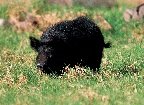Question: I learned recently that some Indians on a reservation in my area released some pigs for hunting purposes and now they are breeding and beginning to populate the area where I walk my dogs in Descanso, California. Are these pigs a threat to me or my dogs? (Sheri M., San Diego)
Answer: We do know that wild pigs inhabit some of the areas around Julian and Descanso. However, we are unable to positively identify the mechanism for their recent introduction.
According to Marc Kenyon, Statewide Coordinator for the Bear, Mountain Lion and Wild Pig Programs at the Department of Fish and Game (DFG), wild pigs are timid creatures that simply want to be left alone for the most part. However, they can be very aggressive if approached and they perceive the person as a threat (particularly if they have piglets nearby). If you see a wild pig while recreating in the outdoors, please try to avoid approaching it. You can stand still and maintain your dog close to you on the leash. Pigs are nearsighted and will tend to ignore objects that stand completely still.
Furthermore, pigs have a great sense of smell. They will smell you before they see you. If you walk with the wind at your back, your scent is more likely to be detected at great distances by wild pigs, and they will likely avoid you.
However, there have been some instances where wild pigs have come into contact with people. Usually only one pig will approach while the rest of the group of pigs (known as a sounder) evacuate the area. If this does happen to you, try to stay away from the head of the pig. They have sharp teeth that can cut through clothing. Back out of the area as quickly as possible.
Question: Is it legal to pick up sand dollars on the beaches of San Francisco, with or without a fishing license, even though some are still alive — purple in color with hair (fuzz)? (Peter R.)
Answer: If you are in an area where tidal invertebrates may be taken, you may take and/or possess up to 35 live sand dollars. A current sport fishing license is required for anyone 16 years of age or older. A license is not required to pick up empty shells. See section 29.05 in the Ocean Fishing Regulations for a list of areas where it is legal to take fish from the beach/tidepool areas.
Question: I live in Imperial County and would like to go coyote and skunk hunting but need to know the biggest caliber of gun that can be used. I do see that for raccoon you may not use a caliber larger that a .22 rimfire. What can I use for coyote and skunk? (Robert A.)
Answer: There is no maximum rifle caliber specified in Fish and Game regulations for taking coyotes and skunks (nongame mammals). Fish and Game regulations authorize nongame mammals to be taken in any manner (see section 475 in the Mammal Hunting Regulation booklet). This authorization includes firearms with no further description or restriction, except when hunting within the California condor range where lead ammunition is prohibited (California Code of Regulations Title 14, section 475(f)).
Question: What kind of a fishing license is required for a person working in California on a visa from a foreign country? (Jackie S.)
Answer: A nonresident license, which may cover one, two or 10 days, or a calendar year of state fishing privileges, would be required to fish in state waters for anyone who is not a California resident. For more information, please see www.dfg.ca.gov/licensing/fishing/fishdescrip.html.
Question: Can a felon with a California hunting license and appropriate tags for deer hunting or for any other game legally hunt with a crossbow during rifle season? (Carl R.)
Answer: Felons may not possess firearms at any time (firearms are defined in California Penal Code, section 12001(b)). Crossbows are not considered archery equipment or a firearm, but they are considered to be a deadly weapon and can be used during rifle seasons. Department of Fish and Game regulations do not prohibit a felon from using a crossbow to hunt with, however, the person should first check with their parole officer to see if a crossbow violates their conditions of parole.













